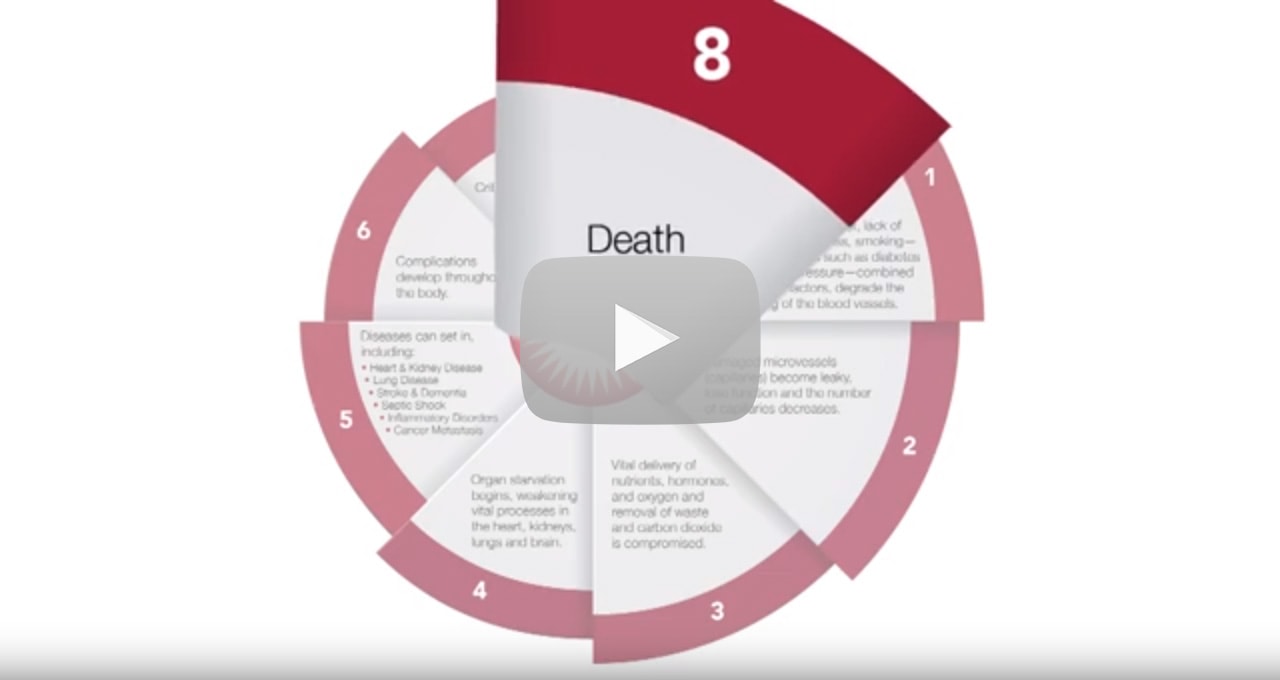Your Organs Could Be Slowly Starving
Your microvascular and capillary system may be breaking down. Your organs could be slowly starving, and you don’t even know it.
These early warning signs may be caused by a problem hidden in the smallest blood vessels in your body—your microscopic capillaries.
You may look—and even feel—healthy on the outside, but inside your microvascular system, a completely different situation could be developing.
Organ starvation is one reason that diseases begin in the body. When the capillaries begin to lose their function, vital organs don't receive the nutrients needed to be healthy... the silent spiral of health decline begins.
Diabetes
Caused by High Blood Glucose Level
A healthy microvascular system is important for transport of glucose from blood to organs.
High blood glucose damages (micro) vascular system and causes blindness, kidney failure, heart attack and stroke.
A healthy microvascular system is important for transport of glucose from blood to organs.
High blood glucose damages (micro) vascular system and causes blindness, kidney failure, heart attack and stroke.
Heart Disease
Loss of Pump Function of Heart
Loss of microvascular density causes heart attack.
Insufficient number of capillaries per heart muscle fiber impairs heart pump function (heart failure).
Loss of microvascular density causes heart attack.
Insufficient number of capillaries per heart muscle fiber impairs heart pump function (heart failure).
Stroke
Blood Clot in Brain Artery Causing Brain Damage
Damage to vascular wall causes blood clots.
Microvascular damage causes White Matter Lesions with poor neurological prognosis.
Damage to vascular wall causes blood clots.
Microvascular damage causes White Matter Lesions with poor neurological prognosis.
Septic Shock
Loss of Circulation Blood Volume Causes Drop in Blood Pressure
Can lead to Impaired organ blood flow resulting in acute kidney failure, reduced lung function, heart attack, stroke and brain damage
Leaky microvessels result in loss of blood plasma volume to tissue space.
Damaged vascular wall causes increased blood clotting and inflammation.
Can lead to Impaired organ blood flow resulting in acute kidney failure, reduced lung function, heart attack, stroke and brain damage
Leaky microvessels result in loss of blood plasma volume to tissue space.
Damaged vascular wall causes increased blood clotting and inflammation.
Hypertension
Blood Pressure is Higher than Accepted Level
Hypertension is associated with loss of microvascular density.
Hypertension increases cardiovascular risk (heart attack, stroke, kidney failure).
Hypertension is associated with loss of microvascular density.
Hypertension increases cardiovascular risk (heart attack, stroke, kidney failure).
Kidney Disease
Impaired Production of Urine Causing Increased Blood Volume and Hypertension
Damage of microvessels causes leakage of blood proteins into urinary space, damage of renal filtration units and kidney failure.
Damage of microvessels causes leakage of blood proteins into urinary space, damage of renal filtration units and kidney failure.
Inflammatory Disorders
Rheumatoid Arthritis, Vasculitis, Allergies, Glomerulonephritis, Autoimmune Diseases, Scleroderma, and Atherosclerosis
Attack of microvascular system by inflammatory cells results in loss of capillaries.
Increased capillary permeability causes tissue edema.
Attack of microvascular system by inflammatory cells results in loss of capillaries.
Increased capillary permeability causes tissue edema.
Compromised Immunity
Viral and Bacterial Infections
Attack of microvascular system by inflammatory cells results in loss of capillaries.
Increased capillary permeability causes tissue edema.
Attack of microvascular system by inflammatory cells results in loss of capillaries.
Increased capillary permeability causes tissue edema.
Cancer Metastasis
Uncontrolled Growth of Tumors
Leaky microvessels allow tumor cells to enter the vascular system and redistribute to different parts of our body, causing tumor metastasis (secondary tumors).
Leaky microvessels allow tumor cells to enter the vascular system and redistribute to different parts of our body, causing tumor metastasis (secondary tumors).


